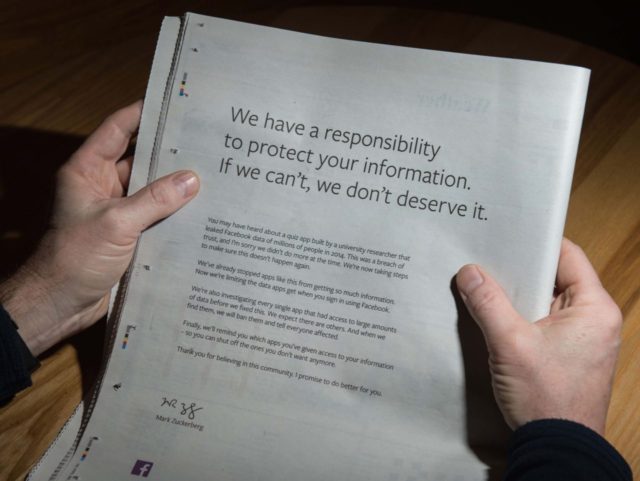Gov. Jerry Brown and the Democrat-controlled California legislature surrendered to privacy advocates and passed some of the world’s strongest online protections to prevent a November initiative vote on even stronger protections.
San Francisco real estate developer Alastair MacTaggart put up over $2 million of his own money to qualify the “California Consumer Personal Information Disclosure and Sale Initiative” for the November ballot. The initiative would have given California consumers the world’s best online privacy. But MacTaggart pulled his initiative after Gov. Brown and the Legislature reluctantly passed AB 375, the California Consumer Privacy Act of 2018.
MacTaggart told Breitbart News that signature-gathering by his “Californians for Consumer Privacy” (CCP) organization received an incredible boost after a Facebook scandal over selling the personal data of its users.
The day after Whistleblower Christopher Wylie told the British Parliament that Facebook and others can listen to users at home or at work through cell phone apps, the stock prices of FANGs (Facebook, Apple, Netflix, and Google) and other tech stocks crashed.
Prior to the scandal, Google, Facebook, Verizon, Comcast and AT&T had each made $200,000 contributions to a committee opposing the proposed ballot initiative. MacTaggart was told that even if by some luck his organization collected the 356,880 valid signatures to qualify an initiative for the November ballot, opponents would outspend his election effort by $100 million.
But with the media drumbeat of horror stories during April and May — including how Amazon Echo, Apple Siri and Google Home devices could gather personal data while not in use — CCP gathered over 629,000 signatures/
Faced with polls showing overwhelming support, some of the same corporations that opposed the initiative asked the legislature to cut a deal with MacTaggart and CCP to pass a consumer privacy bill that was less financially devastating than the initiative.
The text of the bill provides:
(1) The right of Californians to know what personal information is being collected about them.(2) The right of Californians to know whether their personal information is sold or disclosed and to whom.(3) The right of Californians to say no to the sale of personal information.(4) The right of Californians to access their personal information.(5) The right of Californians to equal service and price, even if they exercise their privacy rights.

COMMENTS
Please let us know if you're having issues with commenting.